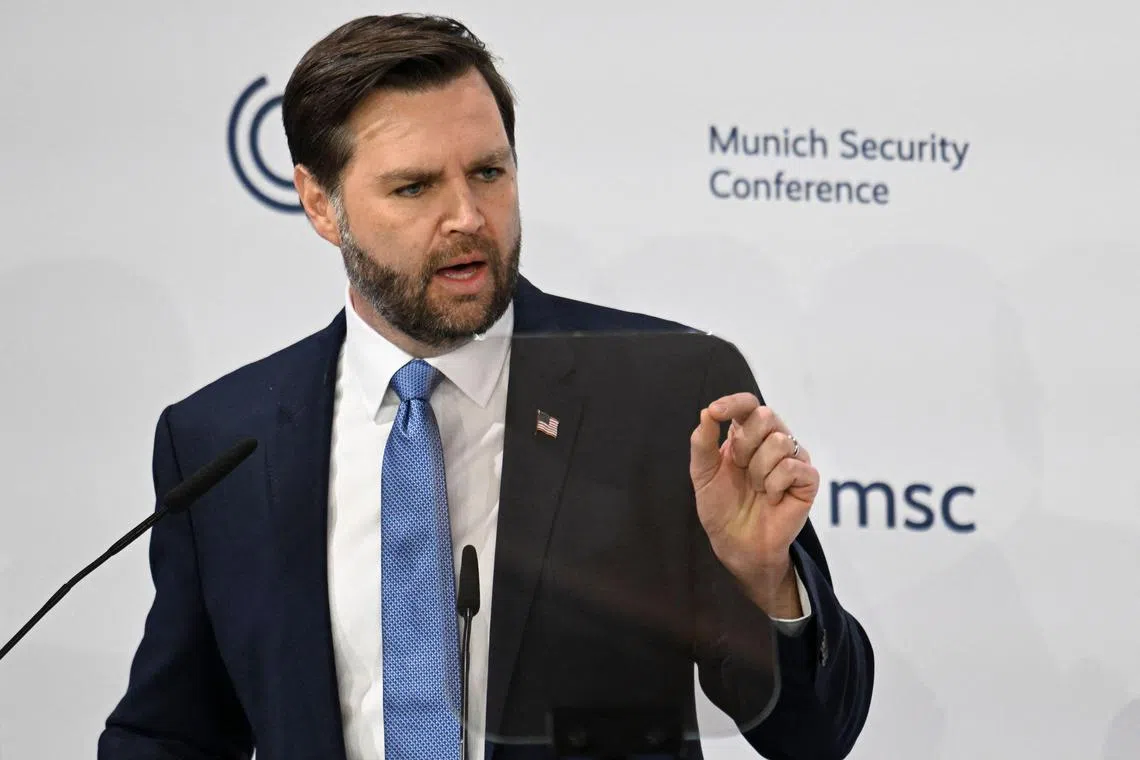News analysis
After sharp attack by V-P Vance, Munich summit attendees wonder if Europe can still trust US as ally
Sign up now: Get ST's newsletters delivered to your inbox

US Vice-President J.D. Vance delivering his speech during the 61st Munich Security Conference on Feb 14.
PHOTO: AFP
MUNICH - Throughout its history, the Munich Security Conference (MSC) has often marked turning points – whether in debates over the Iraq War or Russia’s annexation of Crimea. But the 2025 conference, the 61st summit, will go down in history as a radical watershed. What unfolded in Munich in recent days signified nothing less than the end of the old world order.
During his speech at the MSC, United States Vice-President J.D. Vance did not focus on the details of a peace plan for Ukraine – a topic controversial enough on its own. Instead, he chose to deliver a lesson on democracy
What the Vice-President said in Munich was not the language of an ally, neither in style nor in content. It was the rhetoric of an adversary.
Europe, he declared, was in a “crisis of your own making”. Mr Vance went even further, arguing that neither Russia nor China posed the greatest threat to the West, but rather, the dangers arising from its own actions.
While many conference attendees had known what to expect from Mr Vance, their concerns had already been heightened days earlier.
In an interview with The Wall Street Journal, he had shown some sympathy for the far-right Alternative for Germany
For Germany, whose transatlantic partnership has been a cornerstone of its foreign policy for decades, the events in Munich felt surreal – like a bad dream.
Defence Minister Boris Pistorius strongly rejected Mr Vance’s accusations. “It is unacceptable,” he stated, deviating from his original script, “for Vance to question European democracies and compare them to authoritarian systems.”
Mr Pistorius, widely regarded as a competent and pragmatic politician, raised his voice in frustration: “Democracy does not mean that a loud minority is automatically right or defines the truth. A democracy must defend itself against extremists who seek to destroy it.”
Mr Pistorius added that he is grateful and proud to live in a Europe that defends its democracy and its way of living in freedom every day, against internal and external enemies. “That is why I firmly reject the impression Mr Vance has tried to create – that minorities in our democracy are being oppressed or silenced.”
In his response, German Chancellor Olaf Scholz said: “It is not for others to give us the advice to cooperate with this party that we are not working with for good reasons... That is not appropriate, especially not among friends and allies. We firmly reject that.”
The remarks by the US Vice-President were part of a broader pattern of hostilities from the White House towards Europe. First, President Donald Trump announced import tariffs on European products Europe would benefit from US advances in artificial intelligence
And just hours before the conference began, it emerged that Mr Trump had privately discussed a potential peace deal in Ukraine
Mr Trump seemed to have agreed that Ukraine will not become a Nato member
On the conference floor and in private conversations, shock was palpable. This was nowhere more so than in Germany, the second-largest contributor of aid to Ukraine after the US. Yet, suddenly, Germany found itself not even at the sidelines – but as an outright spectator.
The word “betrayal” was already circulating among the attendees. The question was: Can Europe still trust the US as an ally?
Trust in American military support is the foundation of Nato. Article 5 of the Nato treaty guarantees that if one member is attacked, the others will come to its defence. Should this commitment be eroded, Nato’s role as a collective defence alliance would be undermined. For Europe, this would be an open invitation to aggressive powers like Russia, as the threat of American intervention would no longer be assured.
Things could get even worse. Approximately 35,000 active-duty US military personnel are currently stationed in Germany, the largest US troop presence in any European country. In total, about 65,000 US troops are permanently based across Europe. “They sure will be diminished,” an American predicted on the sidelines of the conference.
Days before, US Defence Secretary Pete Hegseth had stated that so far, no cuts are planned. However, this may change since all deployments are being checked.
Ms Stefanie Babst, a former Nato deputy assistant secretary-general, commented after the watershed speech by Mr Vance: “The very first thing I would put on my to-do list would be a discussion with France and the UK about strengthening Europe’s nuclear deterrent in order to set the course for an own nuclear deterrent capability.”
Ms Katarzyna Pisarska, chair of the influential Warsaw Security Forum, said during a side event in Munich: “Never at the MSC have I seen so much fear in the eyes of the people here.”
She was critical of the US government for taking decisions that directly impact European security over the heads of its allies. “This is a US government that is potentially hostile to us,” she said.
Ms Pisarska added: “So many times in the past, we have heard that Europe has to get its act together – but nothing happened. But if we don’t act now, we will hate the reality we will wake up to when our fate is decided in Washington, Moscow and Beijing.”
Since one of the reasons for the EU’s sluggishness is its sheer size – 27 members – and diversity, backdoor talks in Munich also revolve around the contours of a new Europe. This is happening against the backdrop that not all EU member states are wholeheartedly supporting Ukraine or the idea of liberal democracy. This applies to Hungary, Slovakia, and probably also to Austria, countries led by right-wing populists. Hungary, in particular, has produced numerous roadblocks, thus hampering EU decision making.
There is already a group called the Nordic-Baltic Eight, consisting of Denmark, Estonia, Finland, Iceland, Latvia, Lithuania, Norway and Sweden. Another group of like-minded Europeans is the so-called Weimar Triangle Plus with Germany, France, Poland, Britain, Italy, Spain, the EU Commission and Ukraine.
In a joint statement, the Weimar group has already demanded a seat at the table when the future of Ukraine is discussed. It also said: “We recall that the security of the European continent is our shared responsibility. Therefore, we are working together to strengthen our collective defence capabilities”.
Yet, there was also a hard truth behind the confrontation. For years, European leaders have promised to take responsibility for their own security, pledging to increase defence spending, cut bureaucracy and become more decisive. But time and again, Europe has fallen back into complacency, relying on the US as the ultimate security guarantor.
Now, the moment of truth has arrived. Or, as defence expert Roderich Kiesewetter of the conservative Christian Democratic Union of Germany put it: “Our lifeline has come to an end.”
Markus Ziener is a professor at Media University Berlin and writes on political and security issues.



